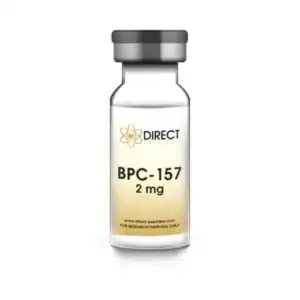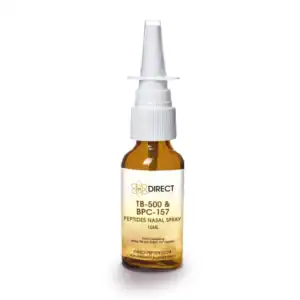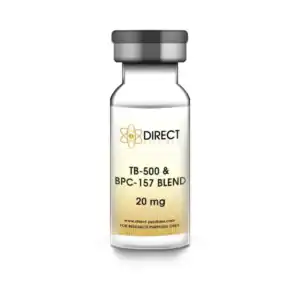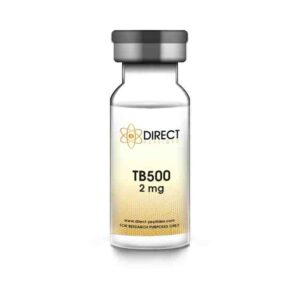Peptide therapy has become more popular over time. Each peptide has special traits that make it helpful for different health conditions. Two peptides that stand out for their healing abilities are TB500 and BPC-157.
These peptides are known for helping tissues heal and grow back quickly. Research studies show promising results with their use.
In this blog, we’ll look at the research possibilities for the combination of TB500 and BPC-157. We’ll also explain how they work, their features, and what they might be used for in the future.
BPC-157 and TB500 are two peptides that have been the focus of numerous Japan scientific studies due to their potential healing and regenerative properties.
 BPC-157, also known as Body Protection Compound 157, is a small protein-like molecule (pentadecapeptide) that comes from human gastric juice.
BPC-157, also known as Body Protection Compound 157, is a small protein-like molecule (pentadecapeptide) that comes from human gastric juice.
It has strong healing properties and helps with ulcers, making it useful for protecting the stomach and gastrointestinal tract. It supports the healing of the gut and helps prevent digestion problems.
BPC-157 also works on other tissues, like skin, muscles, and bones, speeding up recovery. For example, studies on animals show that it helps ligaments heal faster.
It also reduces inflammation and supports the repair of tendons and ligaments. This compound has shown promise in research for various conditions, including arthritis, nerve injuries, and brain injuries.
Direct Peptides offers premium quality BPC-157 peptides for sale online with fast worldwide shipping. Offering researchers a range of formulations, including vials, capsules, nasal sprays, and pre-mixed pens, enhances flexibility in their research endeavours.
TB500, or Thymosin Beta 4, is a natural protein found in the body, mainly in blood platelets. It plays an important role in tissue repair. It helps keep muscle mass, supports healing, reduces inflammation, and aids cell movement.
TB500 speeds up healing for skin wounds, heart injuries, and broken bones. It may also help reduce inflammation and improve how organs work.
Direct Peptides provides top-quality TB-500 peptides available for purchase online, ensuring rapid global delivery. We cater to researchers’ diverse needs by offering a variety of formulations such as vials, capsules, nasal sprays, and pre-mixed pens, thereby enhancing the flexibility of their research projects.
 Now, let’s look at how these two peptides might work together synergistically. When combined, peptide blend TB500 and BPC-157 could potentially enhance each other’s healing capabilities.
Now, let’s look at how these two peptides might work together synergistically. When combined, peptide blend TB500 and BPC-157 could potentially enhance each other’s healing capabilities.
In theory, the combination of these two peptides could result in a more efficient and effective healing process.
However, it’s important to note that while individual studies on BPC-157 and TB500 show promise, there is currently limited research available on the synergistic effects of these two peptides when used together and further study is needed.
Explore Peptide Supplies at Direct Peptides for all your reconstitution requirements.
TB500 and BPC-157 are peptides known for their ability to promote healing and support injury recovery in the body. They can help with tissue repair, facilitate cell migration and proliferation, reduce inflammation, improve flexibility, and support mobility and muscle growth. These peptides have gained popularity among athletes and individuals seeking faster recovery from injuries.
 While both these peptides have unique properties, their combined use could potentially offer even more significant benefits in the health and medical fields.
While both these peptides have unique properties, their combined use could potentially offer even more significant benefits in the health and medical fields.
Combining TB-500 and BPC-157 could enhance the healing process. BPC-157 supports tissue repair, while TB-500 helps regulate the immune response and promotes stem cell production. Together, they may offer a strong solution for joint and tissue repair, particularly for those recovering from injuries or surgeries, or athletes seeking faster recovery.
It’s important to note that while these peptides show promise, they are still in the experimental stage. Most existing research comes from animal studies, and more human trials are needed to confirm their effectiveness. Additionally, the long-term effects and potential side effects remain unclear.
The use of peptides in medicine is an exciting area of research. The combination of TB-500 and BPC-157 could advance regenerative medicine, potentially leading to better treatments for injuries and degenerative diseases. However, further studies are essential to fully understand their potential impact on future medical treatments.
Peptide blend TB500 and BPC-157 work by binding to receptors in the body to stimulate tissue repair and supports tissue regeneration through various mechanisms of action. TB500 stimulates the migration of cells to the site of injury, increases the rate of blood flow, angiogenesis, and helps to reduce recovery time and inflammation.
BPC-157, on the other hand, works by promoting cellular regeneration by increasing the production of growth factors, blood vessel formation, and stabilizing the integrity of blood vessels.
Japan Researchers have studied the peptide blend TB500 and BPC-157 to understand how they work and how safe they are. In one study, TB500 helped wounds heal faster in rats. It also reduced scarring by improving blood vessel growth and lowering inflammation.
Another study looked at BPC-157 and found it helped with gastroesophageal reflux disease (GERD) and eased symptoms of stomach ulcers in rats. These studies are just a few examples showing how these peptides might be used in research.
Peptide therapy is a growing field of medical research showing great potential for treating injuries and diseases. Among the most studied peptides are TB500 and BPC-157, which are known for their healing and therapeutic effects.
Japan Research suggests these peptides could help with a variety of injuries and health problems. However, more studies are needed to fully understand how they work, their safety, and any long-term risks. TB500 and BPC-157 highlight an exciting area of scientific exploration. Future research may uncover even more benefits.
Peptides with healing properties could be a big step forward for regenerative medicine. Peptides like GHK-cu, Ipamorelin, CJC-1295 DAC, MGF, and B7-33 show promise.
GHK-cu helps with wound healing and skin repair—visit the GHK-CU category page for more information.
Ipamorelin boosts growth hormone to support tissue repair—visit the Ipamorelin category page for more information.
CJC-1295 DAC promotes growth hormone release to aid recovery—visit the CJC-1295 DAC category page for more information.
MGF (Mechano Growth Factor) may help repair and rebuild muscles—visit the MGF category page for more information.
B7-33 is being studied for how it might protect the heart—visit the B7-33 category page for more information.
Peptide therapy could unlock new treatments for wound healing, muscle repair, and anti-aging. With more research, peptides have the potential to revolutionize current healing and treatment methods.
These peptides are strictly for research purposes only and are not intended for human use.
[1] Zheng XY, Lv YF, Li S, Li Q, Zhang QN, Zhang XT, Hao ZM. Recombinant adeno-associated virus carrying thymosin β4 suppresses experimental colitis in mice. World J Gastroenterol. 2017 Jan 14;23(2):242-255.
[2] Djakovic Z, Djakovic I, Cesarec V, Madzarac G, Becejac T, Zukanovic G, Drmic D, Batelja L, Zenko Sever A, Kolenc D, Pajtak A, Knez N, Japjec M, Luetic K, Stancic-Rokotov D, Seiwerth S, Sikiric P. Esophagogastric anastomosis in rats: Improved healing by BPC 157 and L-arginine, aggravated by L-NAME. World J Gastroenterol. 2016 Nov 7;22(41):9127-9140.
[3] Gao XY, Hou F, Zhang ZP, Nuo MT, Liang H, Cang M, Wang ZG, Wang X, Xu T, Yan LY, Guo XD, Liu DJ. Role of thymosin beta 4 in hair growth. Mol Genet Genomics. 2016 Aug;291(4):1639-46.
Shop ALL Blend Peptides online here, Direct Peptides has a comprehensive list of premium peptide blends for research.

TWIN PACKS
BPC-157 Peptide Vial
£11.46 – £61.88Price range: £11.46 through £61.88 Select options This product has multiple variants. The options may be chosen on the product page
TB500 BPC157 Blend Nasal Spray
£85.00 – £165.00Price range: £85.00 through £165.00 Select options This product has multiple variants. The options may be chosen on the product page
TWIN PACKS
TB500 BPC157 Blend
£77.00 – £138.60Price range: £77.00 through £138.60 Select options This product has multiple variants. The options may be chosen on the product page
BULK BUY
BULK BUY
BULK BUY
BULK BUY
TB500 Peptide Vial
£13.70 – £93.85Price range: £13.70 through £93.85 Select options This product has multiple variants. The options may be chosen on the product pageALL CONTENT AND PRODUCT INFORMATION AVAILABLE ON THIS WEBSITE IS FOR EDUCATIONAL PURPOSES ONLY.
DISCLAIMER: These products are intended solely as a research chemical only. This classification allows for their use only for research development and laboratory studies. The information available on our Japan Direct Peptides website: https://direct-peptides.com is provided for educational purposes only. These products are not for human or animal use or consumption in any manner. Handling of these products should be limited to suitably qualified professionals. They are not to be classified as a drug, food, cosmetic, or medicinal product and must not be mislabelled or used as such.